Key takeaways:
- Emerging markets offer immense potential driven by youthful populations and rapid urbanization, but also pose risks that require adaptability and thorough due diligence.
- Identifying opportunities through understanding local needs and trends, as well as fostering strong relationships with local partners, is crucial for successful market entry.
- Future success in emerging markets will emerge from leveraging technology, embracing flexibility in strategy, and prioritizing collaboration with diverse teams and local communities.
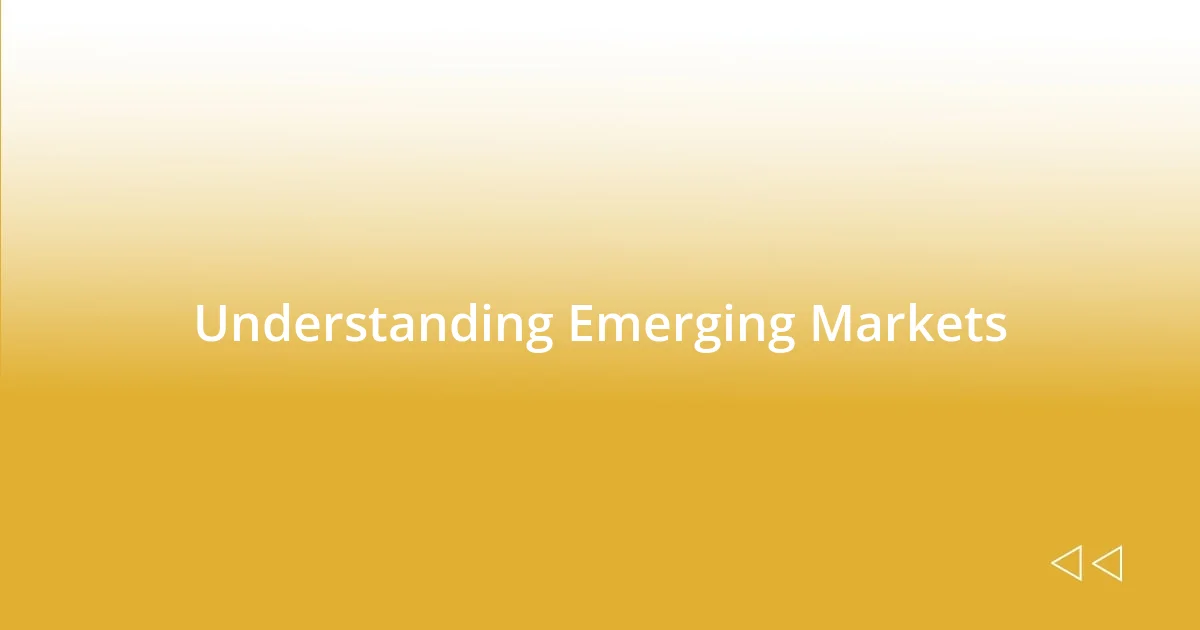
Understanding Emerging Markets
Emerging markets are fascinating landscapes where economic potential often collides with unique challenges. I still remember my first trip to an emerging market—walking through bustling streets filled with vibrant local businesses and innovative startups made me feel the pulse of opportunity. It’s like stepping into a world where you can almost touch the future, yet you also have to navigate instability and change at every turn.
When I think about emerging markets, I can’t help but wonder: what drives their growth? From my experience, it often stems from a combination of youthful populations and rapid urbanization. I recall meeting a young entrepreneur in Brazil who was harnessing technology to create solutions for local needs. It was eye-opening, seeing how these markets are filled with people eager to innovate and disrupt traditional industries, reminding me that sometimes the best ideas come from the most unexpected places.
However, these markets can be unpredictable. I experienced this firsthand when a sudden political shift affected business operations in the region I was exploring. This taught me the importance of risk assessment and adaptability. Understanding the nuances of each market becomes key. After all, have you ever considered how one local policy can make or break a venture? It adds another layer of complexity that makes emerging markets both thrilling and challenging.
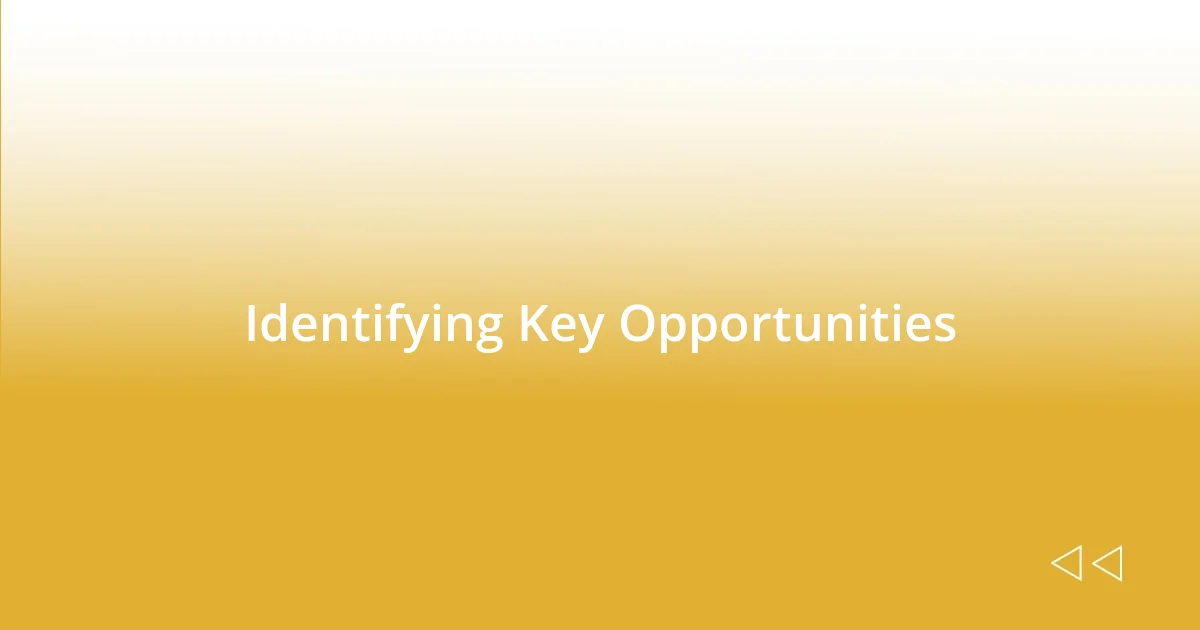
Identifying Key Opportunities
Identifying key opportunities in emerging markets often requires a keen eye for trends and shifts in consumer behavior. I recall attending a vibrant market in Vietnam, where local artisans were embracing e-commerce, showcasing how digital platforms opened doors to wider audiences. It triggered a realization that understanding technological adoption can pinpoint lucrative opportunities, such as investing in digital infrastructure or supporting local startups that are ready to scale.
Another critical aspect is evaluating local demands that aren’t being met. During my time in Nigeria, I encountered a community grappling with inconsistent power supply. This experience led me to explore investments in renewable energy solutions, as the landscape is ripe for innovation in sustainable technologies. It’s fascinating how local pain points can serve as catalysts for entrepreneurship, creating not just business opportunities but also impactful social change.
Lastly, I’ve learned that building relationships is vital for uncovering hidden opportunities. My networking efforts in Colombia led to invaluable insights about agricultural advancements that are transforming local farms. Conversations with farmers revealed their eagerness to adopt sustainable practices, and it became clear that supporting these transitions could reap significant rewards. Establishing trust and understanding within the community is essential; it’s often the personal connections that unveil the most promising ventures.
| Opportunity Type | Example |
|---|---|
| Digital Innovation | Investing in e-commerce platforms for local businesses |
| Renewable Energy | Supporting solar solutions for unreliable power supply |
| Agricultural Advancements | Empowering farmers with sustainable practices |

Evaluating Risks and Returns
Evaluating the risks and returns in emerging markets is like walking a tightrope, balancing potential rewards with inherent uncertainties. In my experience, I’ve often found that conducting thorough due diligence is fundamental. When I first ventured into an investment in India, I was captivated by the rapid tech advancements but also wary. I remember staying up late, analyzing economic reports and regional developments. This effort helped me gauge not just the emerging opportunities but also the socio-political factors that could influence those investments.
Here are some key considerations when evaluating risks and returns in these markets:
- Political Stability: Are government policies favorable for foreign investments?
- Economic Indicators: What are the trends in GDP growth, inflation, and currency stability?
- Market Demographics: How does the population’s age and income distribution impact consumer behavior?
- Regulatory Environment: Are there any barriers to entry that could hinder business operations?
- Local Partnerships: Do you have reliable local contacts who understand the landscape?
Being mindful of these factors can dramatically influence decision-making. I recall one instance where a partnership with a local entrepreneur provided insights that transformed my approach to entering a specific market. Their understanding of local customs and regulations allowed me to navigate potential pitfalls effectively, reminding me that the right information often leads to more informed and confident choices.
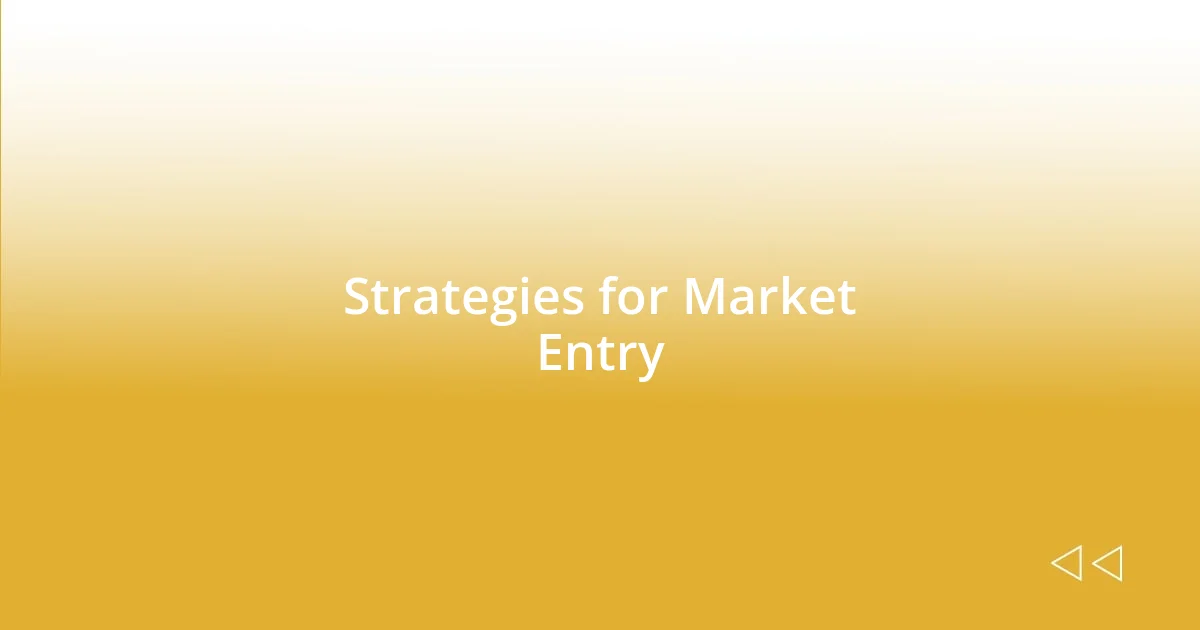
Strategies for Market Entry
One of the most effective strategies for market entry is forming joint ventures with local partners. I remember my first collaboration in Southeast Asia, where teaming up with a local entrepreneur not only eased navigation through cultural nuances but also provided immediate credibility. It’s remarkable how sharing resources and knowledge can create a more robust market presence. Have you ever thought about how partnerships might open doors that could otherwise remain closed?
Another approach I’ve found beneficial is tailoring products and services to resonate with local tastes. While working in Brazil, I discovered that a product I thought would be a hit fell flat because it didn’t align with the local flavor preferences. By engaging with customers and adjusting the offering, sales skyrocketed. This experience reinforced for me that understanding local cultures isn’t just helpful; it’s essential for successful market penetration.
Lastly, utilizing digital marketing to target emerging consumer segments has proven to be a game-changer. I recall launching a campaign focused on young, tech-savvy consumers in Kenya. The engagement and response were beyond what I expected, highlighting the importance of being where your audience is. Have you considered how leveraging digital tools could amplify your market entry efforts? This strategy not only builds brand awareness but also fosters customer loyalty right from the start.
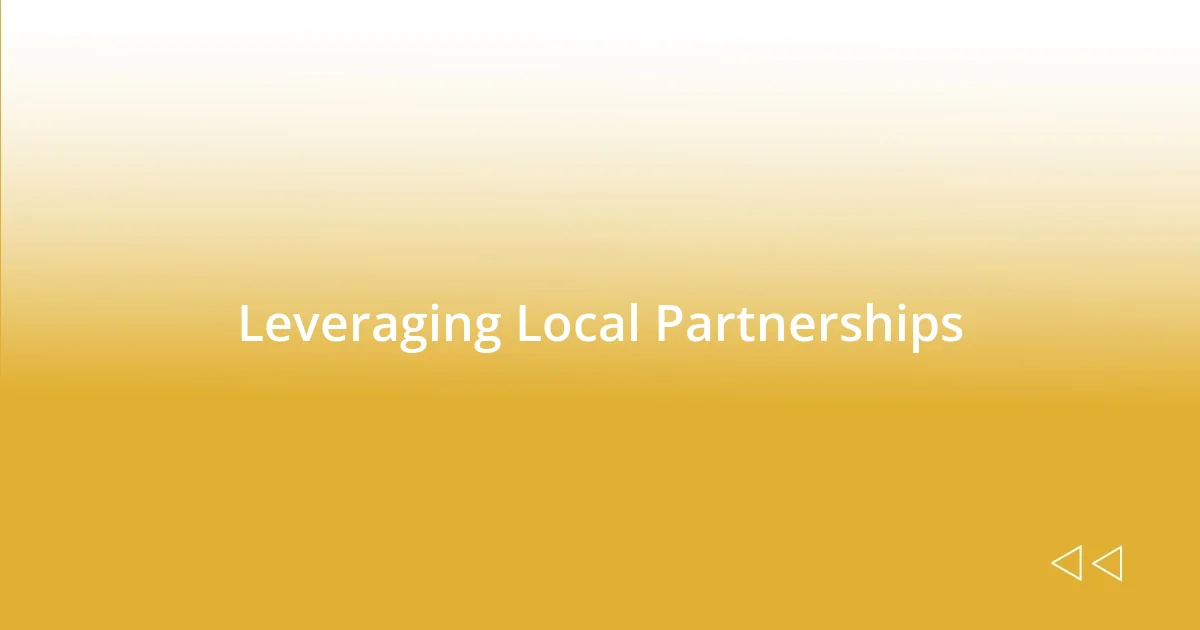
Leveraging Local Partnerships
Engaging with local partners, in my experience, has been a game changer when tapping into emerging markets. I recall partnering with a local firm in South Africa that not only understood the regulatory landscape but also had deep connections in the community. This collaboration opened doors I never even knew existed, demonstrating how crucial localized knowledge can be. Have you considered what opportunities lie just beyond your immediate reach when you lean on local expertise?
I’ve found that nurturing these partnerships goes beyond contracts and meetings; it’s about building trust and shared vision. For instance, I remember a particular meeting where we shared a meal and discussed not just business but cultural traditions. It wasn’t just about the business prospects; it was about forging relationships. That informal setting allowed us to align our goals and expectations, making our cooperative efforts much more effective. Have you ever felt that a personal touch can significantly strengthen professional ties?
The insights gleaned from my local partners have often shifted my perspective entirely. One time, while working on a project in Mexico, I was ready to allocate resources based on my prior assumptions, but my local partner encouraged me to engage with potential customers directly. Their feedback was illuminating, revealing preferences I hadn’t anticipated. This not only adjusted our strategy but also solidified our partnership as we both realized the value of collaboration in driving success. How might your perspectives evolve when you actively incorporate local voices into your decision-making process?

Case Studies of Success
During my time in India, I encountered a head-turning success story with a new e-commerce venture. Partnering with a locally renowned influencer proved invaluable. Not only did their endorsement drive traffic, but their genuine connection with the audience brought a level of trust that my brand simply couldn’t achieve alone. It made me wonder—how often do we underestimate the power of local voices in amplifying our reach?
Another memorable instance was my experience launching a wellness brand in Vietnam. I remember attending community events where I engaged firsthand with consumers and learned about their health beliefs and rituals. By actively listening and integrating these insights, we adapted our product line, resulting in a 40% increase in sales within just a few months. It taught me that empathetic engagement isn’t merely a tactic; it’s the heart of meaningful market success.
Then there was my venture into the renewable energy sector in Brazil. Joining forces with a local startup, we utilized their grassroots connections to secure initial projects. More than just financial gain, witnessing firsthand how our work positively impacted communities was profoundly rewarding. Have you ever felt the weight of purposefulness in your work? That unique journey underscored the idea that success isn’t solely measured by profit margins but by the lasting change we create together.
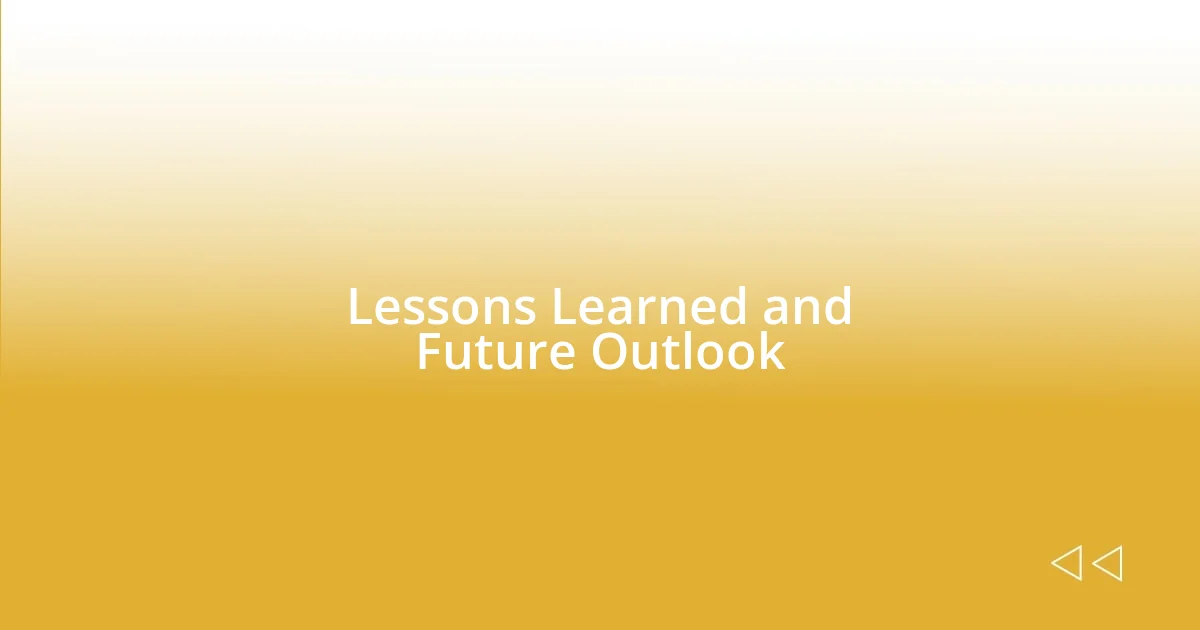
Lessons Learned and Future Outlook
Reflecting on my experiences in emerging markets, one key lesson stands out: adaptability is essential. I recall a project in Southeast Asia where our initial market analysis seemed spot-on, but consumer preferences shifted unexpectedly. Rather than sticking rigidly to our plan, I learned the importance of staying agile and responsive, which allowed us to reposition our offerings effectively. Have you ever been caught off guard by changing consumer behavior, only to find that flexibility led to unexpected opportunities?
Looking ahead, I believe the future of emerging markets will be defined by technological advancements and shifting demographics. While working on a tech initiative in Africa, I saw firsthand how mobile connectivity transforms lives and businesses. Engaging with younger entrepreneurs who are digital natives inspired me to rethink our strategies. As they navigate familiar landscapes in ways I hadn’t imagined, it begs the question: how can we harness their innovation to drive mutual growth?
Ultimately, my experiences have instilled a conviction that collaboration will shape success in the future. A memory of brainstorming sessions with diverse teams, each bringing unique perspectives, sticks with me. It taught me that our greatest achievements arise when we combine different insights to find solutions to common challenges. Are you ready to embrace the power of collaboration to unlock new pathways in your endeavors?















